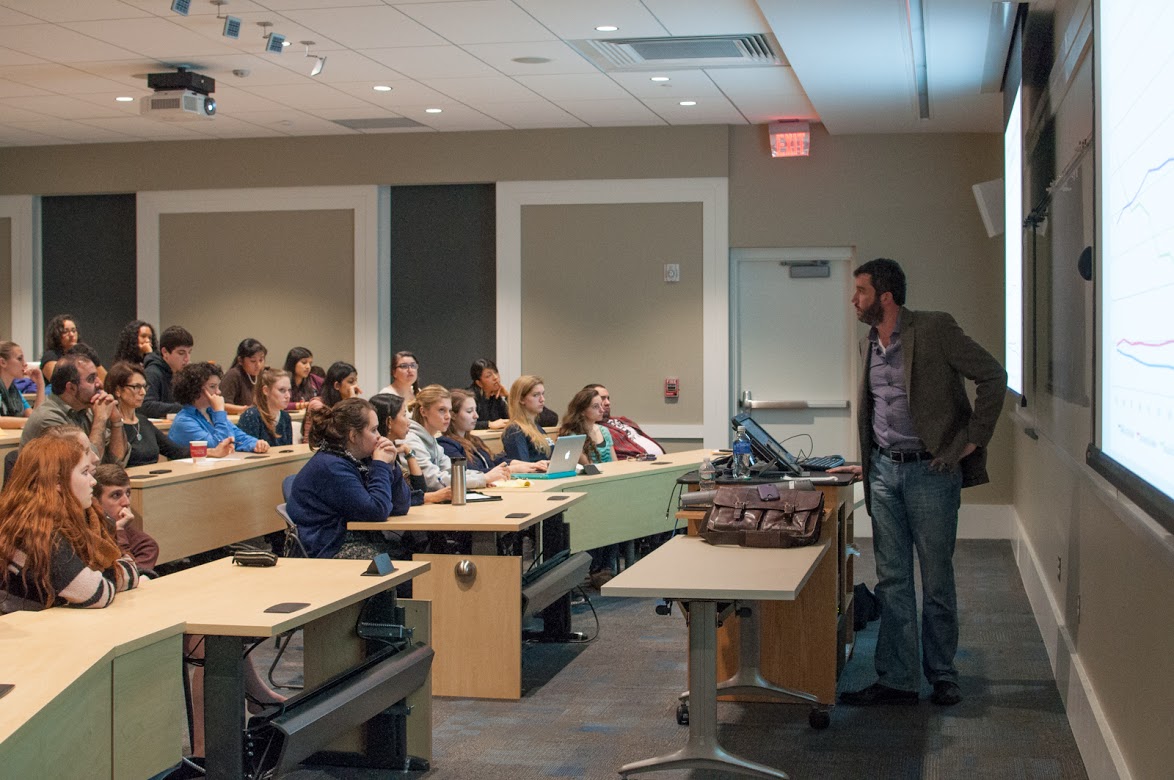According to a post-doctoral research associate at Princeton University, the Arab Uprisings resulted not from poverty and inequality, as many scholars believe, but from a surge in educated but unemployed middle class graduates.
Kevan Harris, a sociologist who has conducted extensive research in the Middle East, gave a lecture at the College on Thursday, Nov. 7 titled “State, Society and Protest in the Middle East in Historical Perspective.”
Because he participated in the Arab Uprisings, Harris’s talk was filled with anecdotes ranging from humorous ones about showing up at the wrong protest to finding out that police violence had happened nearby.
“He had really cool anecdotes,” junior history major Tarika Mahal said. “Like the fact that he was physically there … He was like ‘Yeah, I walked in that.’ I was like, ‘That’s pretty awesome.’”

Harris’s lecture was supported by much statistical evidence as well. He found that the Middle East and North Africa (MENA) region has relatively low poverty levels. He also found that the MENA region is about a 40 on the Gini index, which means that it is average in terms of inequality of wealth. In comparison, Sub-Saharan Africa, Latin America and the Caribbean are “famous for being unequal,” Harris said.
Harris then spoke about the expansion of the welfare state in the MENA in the 1960s and 1970s. Egypt enacted a series of social programs, which involved literacy campaigns, healthcare programs and land reforms. Iran enacted similar social programs. Harris clarified that in a global context, welfare states sponsor broad social programs, not to be mistaken for the type of welfare programs in the United States.
“(A welfare state) doesn’t necessarily mean handouts to poor people,” Harris said.
Because of the relative success of its literacy programs, the Middle East is now experiencing a “race for credentials,” in which too many people are educated compared to the number of skilled jobs available, Harris said. Egypt has a higher percentage of high school graduates than countries like Turkey, Algeria and Syria. In Iran, the percentage of university-age students enrolled in tertiary education doubled from 18 percent in 1999 to 36 percent in 2009, Harris said.
As a result of this, the region has a high number of lumpen intelligentsia, which Harris defined as professional middle class graduates who are forced to find jobs “beneath them.” This results in a sense of frustration over the apparent lack of upward social mobility. Harris spoke about how he had friends in Iran who had degrees but were still unemployed because they refused to partake in unskilled labor. Instead, as they waited for skilled employment, they spent their days discussing philosophy and politics and getting involved in social movements.
Harris also cited data from a survey that Princeton politics professor Amaney Jamal conducted in Egypt in 2011. She found that 8.1 percent of the Egyptian population participated in the February protests, and 46 percent of the protesters had at least some university education.
Harris concluded that the Arab Uprisings resulted from “too many credentials, perceived downward mobility and narrowing opportunities for skilled employment” that were a product of the welfare state. The surge in lumpen intelligentsia led to the protests that eventually toppled the regimes in some countries.
“I was in Egypt all year … and I witnessed firsthand all of the protests he was talking about,” senior international studies major Gayatri Oruganti said. “I knew that the middle class was really involved but … he really opened my eyes to what extent it was involved.”
Harris mentioned that there are a high percentage of lumpen intelligentsia in Turkey and Brazil, which could explain the recent protests in both countries.
In response to some claims that the Middle East is “catching up to the rest of the world” in terms of democracy and modernity, Harris has a different conclusion.
“The Middle East is not catching up to anything,” he said. “It’s showing us what the rest of the world is going through right now.”






